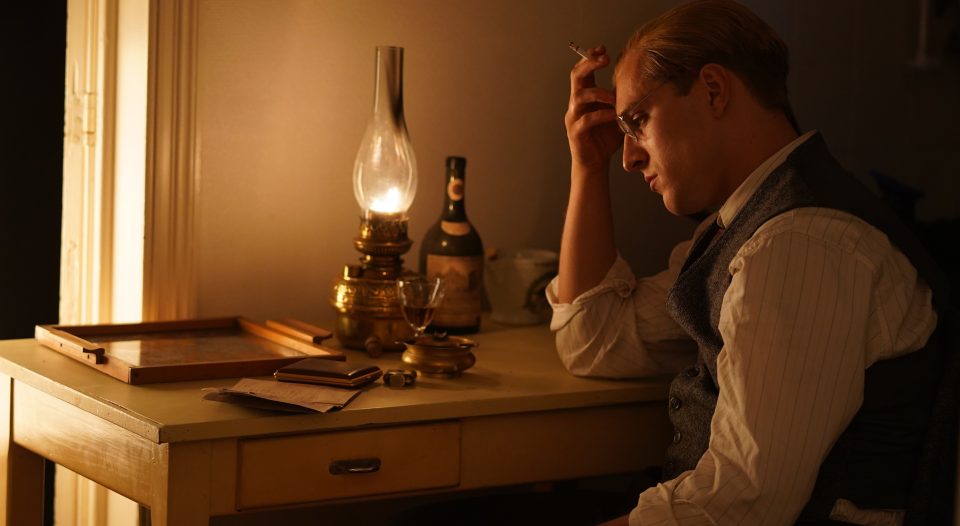The new film Bonhoeffer has put the German theologian in the news again and has sparked plenty of controversy. The International Bonhoeffer Society and members of the theologian’s family have warned that it portrays him as someone who advocates violence. The movie does carry the tagline “Pastor. Spy. Assassin.” Although he was ultimately executed in a concentration camp for his involvement in efforts to overthrow the Nazi regime, labeling him as an assassin is misconstrued and dangerously misguided.
I don’t consider myself a Dietrich Bonhoeffer scholar. I’m more of an evangelist, teaching, preaching and telling whoever will listen to Google “Bonhoeffer” and be inspired. In that context, I tried to keep an open mind as I listened to an interview with the film’s writer-director Todd Komarnicki, who asserted that he wasn’t influenced by characterizations of Bonhoeffer made by writers such as Eric Metaxas, author of Bonhoeffer: Pastor, Martyr, Prophet, Spy (Thomas Nelson, 2011). Many Bonhoeffer scholars have accused Metaxas of manipulating the theologian to fit his far-right agenda.
Regardless of one’s perspective, I recommend that everyone takes time to see the movie and judge for themselves.
After having seen the film, I offer three observations about its accuracy and the dramatic license taken; what I believe is lacking in its depiction; and how it can provide a resource for our faith today.
Bonhoeffer as superhero is contrived
Bonhoeffer is one man’s interpretation of a story that has inspired him for years. As with most historical dramas, Komarnicki is bound to get some things right and others wrong. Still, it’s an impressive attempt at trying to capture Bonhoeffer’s account of standing up for truth, justice and freedom. At times, the film’s portrayal can feel contrived, depicting Bonhoeffer (played by Jonas Dassler) as a superhero willing to forfeit his Christian principles to eliminate the threat of Adolf Hitler. Yet, we miss that Bonhoeffer was a multilayered man who struggled to remain faithful to Jesus’ command to love our enemies.
Understandably, Komarnicki wants to use dramatic devices to keep audiences engaged for nearly two hours. The movie’s depiction of the plot to assassinate Hitler and the moral dilemma surrounding its justification draws us in, prompting the audience to ask what they would do. But many scholars have said that the film crosses the line when Bonhoeffer declares, “I am all in,” because it’s unlikely he would argue that sometimes violence is the only solution.
Regardless of one’s perspective, I recommend that everyone takes time to see the movie and judge for themselves.
It would have been better if the film had included Bonhoeffer’s love for Mahatma Gandhi and his desire to learn from him personally. I don’t believe Bonhoeffer gave up on the idea of nonviolent resistance and its effective power to ultimately change corrupt structures. Some historians have argued that it is more likely he was drawn into the conspiracy to kill Hitler out of his support for family members.
One of the film’s effective devices is using Bonhoeffer’s childhood memories to depict the significance of his family and how he relies on those relationships as he confronts the isolation of prison. These scenes call to mind Bonhoeffer’s Christmas letter to his family (Letters and Papers from Prison; Fortress Press, 2010) and how his memories of their love were a vital resource when he encountered bouts of depression.
Bonhoeffer as Lutheran theologian is lacking
Bonhoeffer was deeply influenced by Martin Luther’s theology and his pastoral example. It’s surprising that the film doesn’t include an exchange over his concern about “cheap grace versus costly grace,” perhaps in a class setting with his students at the underground seminary Finkenwalde.
How Bonhoeffer incorporated Luther’s theology of the cross, as opposed to a theology of glory, would have been enlightening in the film—especially since one could argue that this is where Metaxas and other conservative evangelical proponents of Bonhoeffer go astray in their depictions of him.
The film depicts a meeting between Bonhoeffer and Adam Clayton Powell Sr. (portrayed by Clarke Peters), pastor of the Abyssinian Baptist Church in Harlem, New York City, in which Powell asks Bonhoeffer where he met Jesus. The question initially seems strange to Bonhoeffer, and it should, since Lutheran theology emphasizes that it is God who meets us right where we are and accepts us by grace just the way we are.
Still, Bonhoeffer states in the movie that he truly became a Christian through his experience of the Black church in Harlem. Bonhoeffer also makes it clear that the theologian never abandoned his Lutheran core values and theological framework but rather reassessed the distinction between religion and faith.
Bonhoeffer as pastor could have been shown fully
Bonhoeffer saw himself as a pastor, a calling that was his top priority. His identity as a pastor directly influenced the decisions he made throughout his life. While Bonhoeffer does show him as a preacher and emphasizes the importance of being prophetic, speaking out to the evils affecting his flock, his constant care for the welfare of his parishioners could have been expressed more clearly in the movie. One quote of his I missed was that “the Church is the Church only when it exists for others” (Letters and Papers from Prison).
Bonhoeffer provides a reflection for our own story.
Bonhoeffer’s passion for identifying with the oppressed and excluded led him to conclude that, in his context, Christ was found with the Jewish people, who were being “deported” and scapegoated for all of society’s problems in Europe. I wonder if the proposed policies of deportation of migrants and refugees in our context today should challenge us in a similar way.
I believe Bonhoeffer’s role as pastor also transformed him from being a sometimes arrogant, self-centered person to one who lived out his faith with compassion and caring acts. This was captured in the film in a final communion scene with Bonhoeffer and other prisoners, when he emphasizes that all are welcome to the table.
A reflection for our own stories
Obviously, it’s a monumental task to capture the life and character of Bonhoeffer in a feature-length film. There have been other attempts, including the 2000 TV movie Bonhoeffer: Agent of Grace, which, unlike the new film, includes Bonhoeffer’s relationship with his fiancee, Maria. It also focuses more on his decision to return to Germany to be part of what he had hoped would be the country’s restoration. Martin Doblmeier’s 2003 documentary Bonhoeffer is exceptional in its accuracy and use of firsthand testimonials.
I write this keeping in mind the people in the pews and my friends of other faiths, who have asked me whether they should see it. I care deeply about how they struggle with the profound moral and political challenges they face today.
My utmost concern is to provide inspiration for their faith and give them the resources to have the courage to speak out for those without a platform. I would not hesitate to recommend this movie as a resource for that inspiration—while keeping in mind that it is, of course, one filmmaker’s interpretation of a complex figure and story.
Regardless, as with any good story, Bonhoeffer provides a reflection for our own story. In discussing it, we should ask: How we are being faithful? With whom are we aligning ourselves? And where do we find the liberating love of God today?





